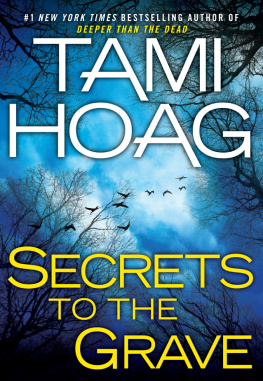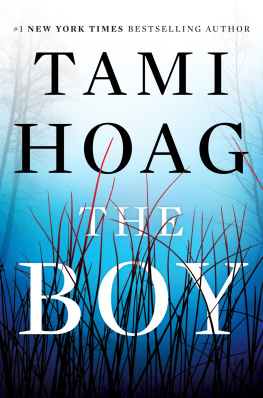Also by Tami Hoag
Deeper Than the Dead
The Alibi Man
Prior Bad Acts
Kill the Messenger
Dark Horse
Dust to Dust
Ashes to Ashes
A Thin Dark Line
Guilty as Sin
Night Sins
Dark Paradise
Cry Wolf
Still Waters
Luckys Lady
Sarahs Sin
Magic
Also by Tami Hoag
Deeper Than the Dead
The Alibi Man
Prior Bad Acts
Kill the Messenger
Dark Horse
Dust to Dust
Ashes to Ashes
A Thin Dark Line
Guilty as Sin
Night Sins
Dark Paradise
Cry Wolf
Still Waters
Luckys Lady
Sarahs Sin
Magic
ABOUT THE AUTHOR
Tami Hoags novels have appeared on national bestseller lists regularly since the publication of her first book in 1988. Her work has been translated into more than thirty languages worldwide. She is a dedicated equestrian in the Olympic discipline of dressage and shares her home with two English cocker spaniels. She lives in Palm Beach County, Florida.
November 1986
The house stood by itself back off the road in a field of dried golden grass, half hidden by spreading oaks. An amalgam of stylespart Spanish, part ranchthe once-white stucco building was weathered in a way that made it seem a part of the natural surroundings, as if it had grown up out of the earth and belonged there as much as any of the hundred-year-old trees.
The scene was a plein air painting, soft and impressionistic: the golden grass, the dark trees, bruise-purple mountains in the background, and the whisper-blue sky strewn with long, thin, pink-tinted clouds; the small white house with its old tile roof. On the other side of the mountains the sun had begun its descent toward the ocean. Here, the day seemed to have paused to admire its own perfection. Stillness held the landscape enraptured.
Nothing gave away a hint of what lay within the house.
The driveway was a path of dirt and crushed rock with grass and weeds sprouted up the middle like the mane of a wild pony. Falling-down fences the color of driftwood created the lane between two overgrown pastures that had once been home to cattle and horses.
A vintage Woody station wagon well past its glory days was parked at a casual angle near an open shed full of rusted farm equipment. An old Radio Flyer red wagon had been abandoned near the front porch with an orange tabby cat sitting in it, waiting for a ride. On the porch two kittens played peekaboo among overgrown pots of parched geraniums and kitchen herbs. One propped herself up on the screen door and peered into the house, then squeaked and leapt and dashed away, tail straight up in the air.
Inside the house nothing moved but flies.
A horrible still life had been staged on the Saltillo tile kitchen floor.
A woman lay dead, her hair spreading out around her head like a dark cloud. Her skin was the color of milk. Her lips had been painted as red as a roseas red as her blood must have been as it drained from the wounds carved into her flesh.
She lay discarded like a life-size broken dollmade up, torn up, and cast aside, her brown eyes cloudy and lifeless.
Beside her lay a smaller dollher childhead resting on her shoulder, face streaked with the last of her mothers lifes blood.
The flies buzzed. The wall clock ticked above the sink.
The telephone receiver dangled near the floor, stenciled with small bloody fingerprints. The last words spoken into it were a whisper still hanging in the air: My daddy hurt my mommy ...
The victim is Marissa Fordham, twenty-eight, single mom. An artist.
Sheriffs detective Tony Mendez rattled off the facts as if unaffected by what he had seen inside the house. Nothing could have been further from the truth. In fact, shortly after he arrived at the scene, he had had to excuse himself from the kitchen to vomit under a tree in the backyard.
He had been second on the scene, the property being on his side of town. The first respondera young deputyhad puked under the same tree. Mendez had never seen so much blood. The smell of it was still like a fist lodged at the back of his throat. Every time he closed his eyes he saw the victims in freeze-frame shots from a horror movie.
His stomach rolled.
You said there were two vics.
Vince Leone, forty-nine, former special agent with the FBIs legendary Behavioral Sciences Unit, former Chicago homicide detective. Leone had been his mentor during his course at the FBIs National Academya training program for law enforcement agencies around the country and around the globe. In fact, Leone had come to Oak Knoll more than a year past in part to work a serial-killer case, in part to try to recruit Mendez to the Bureau.
The case was ongoing. Neither of them had left.
Leone had just arrived on the scene. They drifted slowly away from his car toward the house, both of them taking in the cool, eucalyptus-scented air.
The womans four-year-old daughter, Mendez said. She had a faint pulse. Shes on her way to the hospital. I wouldnt expect her to make it.
Leone muttered an expletive under his breath.
He was an imposing man. Six foot three with a mane of wavy salt-and-pepper hair. A thick mustache drew the eye away from the small, shiny scar marking the entrance wound of the bullet that should have ended his life. Instead, the thing remained in his head, inoperable because of its precarious location.
I hate when its a kid, he said.
Yeah. What did a four-year-old do to deserve that?
Witness.
She knew the killer.
Or hes just one mean bastard.
Id say he has that covered, Mendez said.
They went through the little gate to the yard and followed the rock path around the side of the house, past an old concrete fountain that gurgled soothingly despite the occasion.
Who called it in?
A friend who happened to drop by.
Leone stopped and looked at him. Its the crack of freaking dawn.
To be precise, 7:29 A.M. The sun was barely up.
Yeah, Mendez said. Wait until you meet him. Odd guy.
Odd how?
Looks-like-a-suspect odd. Who drops in on a neighbor at six in the morning?
Is he here?
Hes with Bill.
Bill Hicks, sheriffs detective, Mendezs partner. Hicks had a way of putting people at ease.
Is Cal coming? Leone asked.
Cal Dixon, county sheriff, Mendezs boss.
On his way.
I dont want to step on toes here.
Leone was not on the SO payroll, but he was too good a resource not to call. Studying the countrys worst serial killers for more than a decade, he had seen just about every atrocity one human being could inflict on another. More important, he could discern much from the scene that could point them in a direction in the search for the perpetrator.
I spoke with him, Mendez said. He agreed.
Good.
They paused at the kitchen door. Mendez pointed at the tree.
The official puke zone. In case you need it.
Good to know.
The scene struck him almost as hard going in this time as it had the first time. The contrasts, he decidedand the smell. Visually, the contrasts rocked him. The kitchen was like something from another era: old-fashioned painted cupboards, a cast-iron farmhouse sink, checked curtains, appliances that had to have been from the fifties.
It was the kind of kitchen that should have had June Cleaver or Aunt Bea in it. Instead, crime-scene techs bustled around like so many cooks, dusting this, photographing that, all working around the bloating, discolored body of a murdered woman on the blood-drenched Mexican tile floor.



